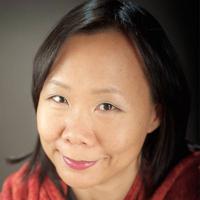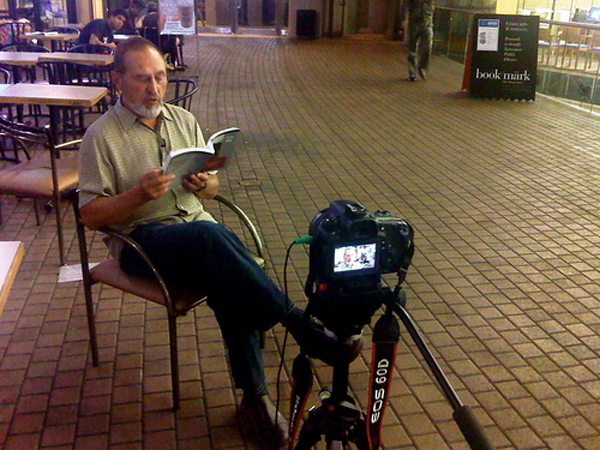The Year of the Dragon is an auspicious time for Canada's new Parliamentary Poet Laureate, Fred Wah, to be officially installed in his two-year post.
As the Parliamentary Poet Laureate position had been left vacant since April 2011, there was concern that it might be on the chopping block. The country's poet laureate position has only existed since 2001, in contrast to the United States (75 years) and Great Britain (600 years). However, after a long delay, Wah was appointed our fifth Parliamentary Poet Laureate on Dec. 20, 2011. The post entails writing poetry for important occasions for use in Parliament, sponsoring poetry readings across the country, advising the Parliamentary Librarian regarding the library's collection and acquisitions, along with other duties.
In a recent email interview, Fred Wah shared his thoughts with me on the current state of poetry in Canada: "I'm struck at how active poetry is, and not just in Canada. Canadian poetry has extended its range of practice in an overwhelming array of style, publication, performance, and academic attention. Of course, digital access is so great now and poetry, because of its natural bent to play with language, moves in that environment in a very dynamic way."
Having participated in past protests by the Writers' Union of Canada on the lawns outside Parliament, Wah is aware of the view that the current government regime has not always been supportive of the arts. Last month, he told the Globe & Mail that he is looking forward to the opportunity to "engage with that paradox of politics and poetry," given that "all creativity is political."
In his role as Parliamentary Poet Laureate, Wah will continue to explore the themes of home, migration, history and identity that have run through his many books. When I asked Wah about the position's job description regarding poetry for official occasions, he seemed very open to the idea. "I can expect to receive requests from Parliament, but it is up to me whether or not to accept them. I've been asked to write something for Queen Elizabeth's Diamond Jubilee, which the Canadian Parliament will begin to celebrate on February 7. I am interested in trying to write something for this, especially considering the ambivalence around racial hybridity, colonialism and the monarchy."
Highly decorated
The appointment is the culmination of Wah's many decades of writing, editing and teaching. While studying English literature and music at the University of British Columbia, Wah was a founding editor and contributor to the avante-garde poetry publication, TISH, during the '60s. He later became the editor or contributing editor of numerous other influential magazines.
Wah taught at Selkirk College, David Thompson University, and the University of Calgary. He was one of the founders of the Kootenay School of Writing in Nelson after the 1984 closure of David Thompson University. He became president of the Writers' Union of Canada in 2001 to 2002. After 40 years of teaching, he retired in 2003.
A writer with a lengthy list of literary publications, Wah has been awarded three major poetry prizes: the Governor General's Award for Waiting for Saskatchewan, Alberta's Stephanson Award for So Far, and B.C.'s Dorothy Livesay prize for poetry for is a door. He has also won awards for his prose and non-fiction.
Past laureates have been George Bowering, Pauline Michel, John Steffler, and Pierre DesRuisseaux, with chosen poets alternating between the two official language communities. (Several cities across Canada also have municipal poet laureates, including Vancouver, which recently appointed Evelyn Lau to its post.)
Wah will be formally installed as Parliamentary Poet Laureate at the beginning of February in Ottawa with a reception in the Speaker of the Senate's chambers. He will be meeting with Parliamentary Library staff to discuss possible programming, including ways of promoting Canadian poetry and Canadian literature in schools.
In the coming months, Wah has several appearances and events scheduled. "I'll be working at the Banff writing program "In(ter)ventions" in February, and then a number of events in Ontario," Wah indicated. "I'm also engaged in a collaborative project with the Oxygen Art Gallery in Nelson called "High Mucka Muck: Playing Chinese" which partially references the history of the Chinese in small interior towns but also, in a more intriguing way, reflects the notion of "Chineseness" in a contemporary and global context."
Wah's gem
Wah's diverse ethnic makeup (his Canadian-born father had both Chinese and Scots-Irish ancestry and was raised in China, while his Swedish mother immigrated to Canada as a child) together with his experiences growing up in Nelson, and working in his father's Chinese-Canadian café formed the basis of one of his most well-known books, the award-winning Diamond Grill.
The Quill & Quire described the book as ''a small gem of a book'' which combines recipes, prose poems, and research material and "beautifully detailed descriptions of the restaurant itself, funny and warm character sketches, and philosophical musings upon anthropology and identity" -- in short, a book very much like its author, a fabulous, eclectic synergy of multiple histories, geographies and chronologies, subverting and transcending straightforward classification.
To mark the start of the Year of the Dragon, Wah suggested including this excerpt below about one of his family's favourite comfort foods served around Chinese New Year. It magically captures the essence of a sensory journey via food through memory, time and space.
Excerpt from Diamond Grill
Juk is a soup we always have after New Years because it's made with left-over turkey. I think of it as the bridge between our white Christmas (presents and turkey stuffing) and our Chinese New Year (firecrackers and juk). As far as I know, all of the Wah families have it and each is distinctive. Aunty Ethel's is pretty good but my Mom still makes my Dad's version once in awhile, though neither she nor Ethel add that little shot of rye whiskey he said was the secret to a really good juk. I couldn't taste liquor but boy his soup was the best, a real treat. But he also used the little red dates, which I'd pick aside; they're too much of a contrast, a little too sweet for the full-bodied ricey broth, and Ethel says you don't really need them.
But if you want to try them, get a package of small red pitted dates at the Chinese supermarket. Also, buy only the smallest package of Chung Toy (salted turnip) since you only need a couple of pieces. For the Fu Juk (dried bean curd) you'll have to decide between flat sheets or ropes; I prefer the ropes because they're chewier. Soak the whole package of Fu Juk over night. Be sure to wash the Chung Toy, its heavily salted. Peel and slice a few fresh water chestnuts. Optional is a bit of the dark seaweed and a few soaked Chinese mushrooms. Put all this with a couple of cups of rice into the turkey stock (you should have about 6-8 cups of liquid) and cook slowly for an hour or so, until the rice is overdone. If not very much of the turkey made it this far and you feel the need for some meat, you can add a bit of sliced pork steak. In the end you should have a thickish gruel, almost a congee.
Juk is even better than Birds-Nest soup, though both soups share an intrinsic proprioceptive synapse: memory. While slurping a bowl of juk with the January snow still swirling outside, the memory of the bird itself, only a few weeks old, triangulates with a smoky star-filled night in China. Likewise, with the gelatinous Birds-Nest soup, the taste carries images of men climbing the walls of dark caves in Yunan collecting the spaghetti-like translucent strands of birds' nests, the frightened cries of the swallows themselves as piercing as a foreign language.
(Reprinted with permission of the author from Diamond Grill (NeWest Press,1996). Copyright © 1996 by Fred Wah.)
An interview with Fred Wah
And here is a video of Fred Wah reading another passage from Diamond Grill and conversing with broadcaster Angela Jung, whose blog is yellowrainbootz.

















Tyee Commenting Guidelines
Comments that violate guidelines risk being deleted, and violations may result in a temporary or permanent user ban. Maintain the spirit of good conversation to stay in the discussion.
*Please note The Tyee is not a forum for spreading misinformation about COVID-19, denying its existence or minimizing its risk to public health.
Do:
Do not: